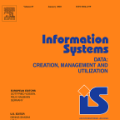Without sufficient information about researchers data sharing, there is a risk of mismatching FAIR data service efforts with the needs of researchers. This study describes a methodology where departmental publications are used to analyse the ways in which computer scientists share research data. All journal articles published by researchers in the computer science department of the case studys university during 2019 were extracted for scrutiny from the current research information system. For these 193 articles, a coding framework was developed to capture the key elements of acquiring and sharing research data. Furthermore, a rudimentary classification of the main study types exhibited in the investigated articles was developed to accommodate the multidisciplinary nature of the case departments research agenda. Human interaction and intervention studies often collected original data, whereas research on novel computational methods and life sciences more frequently used openly available data. Articles that made data available for reuse were most often in life science studies, whereas data sharing was least frequent in human interaction studies. The use of open code was most frequent in life science studies and novel computational methods. The findings highlight that multidisciplinary research organisations may include diverse subfields that have their own cultures of data sharing, and suggest that research information system-based methods may be valuable additions to the questionnaire and interview methodologies eliciting insight into researchers data sharing. The collected data and coding framework are provided as open data to facilitate future research.
翻译:在研究人员数据共享方面,如果没有足够的资料说明研究人员的数据共享,则有可能使FAIR数据服务工作与研究人员的需要不匹配。本研究报告描述了一种方法,即部门出版物用来分析计算机科学家分享研究数据的方法;2019年,案例研究大学计算机科学系研究人员出版的所有期刊文章都从目前的研究信息系统中提取以供审查;关于这193篇文章,制定了一个编码框架,以记录获取和分享研究数据的关键要素;此外,还制定了调查文章中显示的主要研究类型的基本分类,以适应案例部门研究议程的多学科性质;人类互动和干预研究经常收集原始数据,而关于新计算方法和生命科学的研究则更经常公开地使用这些数据;在生命科学研究中,最经常提供数据再利用的数据,而数据共享在人类互动研究中则最少;在生命科学研究研究和新计算方法中,使用开放代码最为频繁;研究结果强调,多学科研究组织可能包括具有自身数据共享文化的多种子领域,并建议研究信息系统方法可能是对数据收集和访谈框架的宝贵补充。




